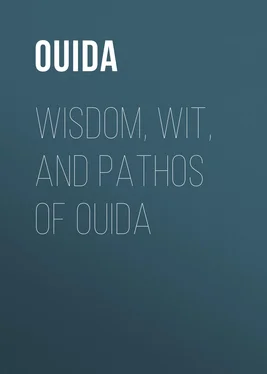Ouida - Wisdom, Wit, and Pathos of Ouida
Здесь есть возможность читать онлайн «Ouida - Wisdom, Wit, and Pathos of Ouida» — ознакомительный отрывок электронной книги совершенно бесплатно, а после прочтения отрывка купить полную версию. В некоторых случаях можно слушать аудио, скачать через торрент в формате fb2 и присутствует краткое содержание. Жанр: foreign_prose, literature_19, foreign_antique, на английском языке. Описание произведения, (предисловие) а так же отзывы посетителей доступны на портале библиотеки ЛибКат.
- Название:Wisdom, Wit, and Pathos of Ouida
- Автор:
- Жанр:
- Год:неизвестен
- ISBN:нет данных
- Рейтинг книги:4 / 5. Голосов: 1
-
Избранное:Добавить в избранное
- Отзывы:
-
Ваша оценка:
- 80
- 1
- 2
- 3
- 4
- 5
Wisdom, Wit, and Pathos of Ouida: краткое содержание, описание и аннотация
Предлагаем к чтению аннотацию, описание, краткое содержание или предисловие (зависит от того, что написал сам автор книги «Wisdom, Wit, and Pathos of Ouida»). Если вы не нашли необходимую информацию о книге — напишите в комментариях, мы постараемся отыскать её.
Wisdom, Wit, and Pathos of Ouida — читать онлайн ознакомительный отрывок
Ниже представлен текст книги, разбитый по страницам. Система сохранения места последней прочитанной страницы, позволяет с удобством читать онлайн бесплатно книгу «Wisdom, Wit, and Pathos of Ouida», без необходимости каждый раз заново искать на чём Вы остановились. Поставьте закладку, и сможете в любой момент перейти на страницу, на которой закончили чтение.
Интервал:
Закладка:
She was quite silent; sunk there on her knees, motionless, and gazing straight, with eyes unblenching, at the light.
There was no sound near them, nor was there anything in sight except where above against the deepest azure of the sky two curlews were circling around each other, and in the distance a single ship was gliding, with sails silvered by the sun. All signs of human life lay far behind; severed from them by those steep scorched slopes swept only by the plovers and the bees. And all the while she looked slow tears gathered in her eyes and fell, and the loud hard beating of her heart was audible in the hushed stillness of the upper air.
He waited awhile: then he spoke to her.
"Since it pains you, come away."
A great sob shuddered through her.
"Give me that pain," she muttered, "sooner than any joy. Pain? pain?—it is life, heaven—liberty!"
For suddenly those words which she had heard spoken around her, and which had been to her like the mutterings of the deaf and the dumb, became real to her with thousand meanings.
The seagulls were lost in the heights of the air; the ship sailed on into the light till the last gleam of its canvas vanished; the sun sank westward lower and lower till it glowed in a globe of flame upon the edge of the water: she never moved; standing there on the summit of the cliff, with her head drooped upon her breast, her form thrown out dark and motionless against the gold of the western sky, on her face still that look of one who worships with intense honour and passionate faith an unknown God.
The sun sank entirely, leaving only a trail of flame across the heavens; the waters grew grey and purple in the shadows; one boat, black against the crimson reflections of the west, swept on swiftly with the in-rushing tide; the wind rose and blew long curls of seaweed on the rocks; the shores of the bay were dimmed in a heavy mist, through which the lights of the little hamlets dimly glowed, and the distant voices of fishermen calling to each other as they drew in their deep-sea nets came faint and weirdlike.
What she wanted was to live. Live as the great moor bird did that she had seen float one day over these pale, pure, blue skies, with its mighty wings outstretched in the calm grey weather; which came none knew whence, and which went none knew whither; which poised silent and stirless against the clouds; then called with a sweet wild love-note to its mate, and waited for him as he sailed in from the misty shadows where the sea lay; and with him rose yet higher and higher in the air; and passed westward, cleaving the fields of light, and so vanished;—a queen of the wind, a daughter of the sun; a creature of freedom, of victory, of tireless movement, and of boundless space, a thing of heaven and of liberty.
In the springtime of the year three gods watched by the river.
The golden flowers of the willows blew in the low winds; the waters came and went; the moon rose full and cold over a silvery stream; the reeds sighed in the silence.
Two winters had drifted by and one hot drowsy summer since their creator had forsaken them, and all the white still shapes upon the walls already had been slain by the cold breath of Time. The green weeds waved in the empty casements; the chance-sown seeds of thistles and of bell-flowers were taking leaf between the square stones of the paven places; on the deserted threshold lichens and brambles climbed together; the filmy ooze of a rank vegetation stole over the loveliness of Persephone and devoured one by one the divine offspring of Zeus; about the feet of the bound sun king in Pherœ and over the calm serene mockery of Hermes' smile the grey nets of the spiders' webs had been woven to and fro, across and across, with the lacing of a million threads, as Fate weaves round the limbs and covers the eyes of mortals as they stumble blindly from their birthplace to their grave. All things, the damp and the dust, the frost and the scorch, the newts and the rats, the fret of the flooded waters, and the stealing sure inroad of the mosses that everywhere grew from the dews and the fogs, had taken and eaten, in hunger or sport, or had touched, and thieved from, then left, gangrened and ruined.
The three gods alone remained; who being the sons of eternal night, are unharmed, unaltered, by any passage of the years of earth. The only gods who never bend beneath the yoke of years; but unblenchingly behold the nations wither as uncounted leaves, and the lands and the seas change their places, and the cities and the empires pass away as a tale that is told; and the deities that are worshipped in the temples alter in name and attributes and cultus, at the wanton will of the age which begot them.
In the still, cold, moonlit air their shadows stood together. Hand in hand; looking outward through the white night-mists. Other gods perished with the faith of each age as it changed; other gods lived by the breath of men's lips, the tears of prayer, the smoke of sacrifice. But they,—their empire was the universe.
In every young soul that leaps into the light of life rejoicing blindly, Oneiros has dominion; and he alone. In every creature that breathes, from the conqueror resting on a field of blood to the nest bird cradled in its bed of leaves, Hypnos holds a sovereignty which nothing mortal can long resist and live. And Thanatos,—to him belongs every created thing, past, present, and to come; beneath his feet all generations lie; and in the hollow of his hand he holds the worlds; though the earth be tenantless, and the heavens sunless, and the planets shrivel in their courses, and the universe be shrouded in an endless night, yet through the eternal desolation Thanatos still will reign, and through the eternal darkness, through the immeasurable solitudes, he alone will wander, and he still behold his work.
Deathless as themselves their shadows stood; and the worm and the lizard and the newt left them alone and dared not wind about their calm clear brows, and dared not steal to touch the roses at their lips, knowing that ere the birth of the worlds these were, and when the worlds shall have perished these still will reign on:—the slow, sure, soundless, changeless ministers of an eternal rest, of an eternal oblivion.
A late light strayed in from the grey skies, pale as the primrose flowers that grew amongst the reeds upon the shore; and found its way to them, trembling; and shone in the far-seeing depths of their unfathomable eyes.
The eyes which spake and said:
"Sleep, dreams, and death:—we are the only gods that answer prayer."
Night had come; a dark night of earliest spring. The wild day had sobbed itself to sleep after a restless life with fitful breath of storm and many sighs of shuddering breezes.
The sun had sunk, leaving long tracks of blood-red light across one-half the heavens.
There was a sharp crisp coldness as of lingering frost in the gloom and the dulness. Heavy clouds, as yet unbroken, hung over the cathedral and the clustering roofs around it in dark and starless splendour.
Over the great still plains which stretched eastward and southward, black with the furrows of the scarce-budded corn, the wind blew hard; blowing the river and the many streamlets spreading from it into foam; driving the wintry leaves which still strewed the earth thickly, hither and thither in legions; breaking boughs that had weathered the winter hurricanes, and scattering the tender blossoms of the snowdrops and the earliest crocuses in all the little moss-grown garden ways.
The smell of wet grass, of the wood-born violets, of trees whose new life was waking in their veins, of damp earths turned freshly upwards by the plough, were all blown together by the riotous breezes.
Now and then a light gleamed through the gloom where a little peasant boy lighted home with a torch some old priest on his mule, or a boat went down the waters with a lamp hung at its prow. For it grew dark early, and people used to the river read a threat of a flood on its face.
Читать дальшеИнтервал:
Закладка:
Похожие книги на «Wisdom, Wit, and Pathos of Ouida»
Представляем Вашему вниманию похожие книги на «Wisdom, Wit, and Pathos of Ouida» списком для выбора. Мы отобрали схожую по названию и смыслу литературу в надежде предоставить читателям больше вариантов отыскать новые, интересные, ещё непрочитанные произведения.
Обсуждение, отзывы о книге «Wisdom, Wit, and Pathos of Ouida» и просто собственные мнения читателей. Оставьте ваши комментарии, напишите, что Вы думаете о произведении, его смысле или главных героях. Укажите что конкретно понравилось, а что нет, и почему Вы так считаете.












